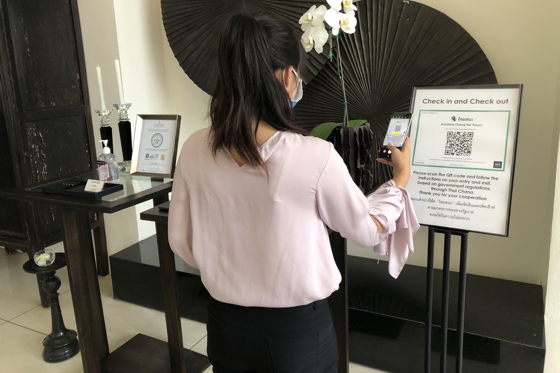Thailand, one of the world’s top tourist destinations, is back in business. Mostly closed since March, hotels began reopening in May, but with international arrivals still curtailed, most properties postponed reopening until further relaxation of travel restrictions in July. That’s when the country moved into Phase 5 of its step-by-step plan to reopen after the lockdown due to the coronavirus.
Contributed by Ron Gluckman
Hoteliers are eagerly awaiting resumption of international business – airports remain closed to virtually all overseas flights in August, and visas are still not available for tourists. Phase 6 should allow limited travel, probably via “bubbles” with countries considered safe from COVID-19. However, just last Thursday Thailand delayed plans for a “travel bubble” agreement with select countries as new daily coronavirus cases rise in parts of Asia.
Until the bubble launches, hotels are focusing on domestic tourism, buoyed by government subsidies designed to boost travel by Thais.
“We’ll be pushing hard for this business,” said Michael Marshall, chief commercial officer at Minor Hotels Group, with 29 hotels in Thailand, including the Anantara and Avani brands. He said domestic business alone won’t sustain a shattered tourism industry that received over 40 million visitors in 2019. “We still need international travel, but at least this helps.”
When the government launched its Rao Tiew Duay Kan (We Travel Together) stimulus package, over 3.5 million Thais signed up within days. Thailand committed 22.4 billion baht (US$722 million) to boost domestic travel, designed to prop up a tourism industry that contributes about 18% to the national economy.
The scheme started in July. It offers support to medical personnel and health volunteers, but most spending will cover an estimated 5 million hotel room nights, plus meals and other amenities. Only Thai residents qualify for subsidies of 40% of hotel fees, up to about US$100 per night, for five nights, in a program running through October. Travel must be outside their home province, and there are additional, smaller subsidies available for flights and buses.
“I don’t think this will be enough, even in the short term,” cautioned Marisa Sukosol, vice president of the Thai Hotels Association. There are over 65,000 hotels in Thailand, with about 1.5 million rooms, she said, estimating that almost a million workers in hotels and the tourism sector had lost their jobs, or were put on leave since the industry shut down in March.

While over 50% of hotels have reopened, occupancy rates remain in the 10% to 20% range. “It’s hard to see this working,” she said. “Thailand is dependent on tourism.”
With few other options, Thai hoteliers have increasingly embraced the domestic market. Bangkok hotels stirred business in July with staycation packages that offered free days, and lavish spa and F&B coupons.
Hotels have developed unique promotions. On Koh Samui, a southern island hard hit by a lockdown that curtailed domestic flights, Dirk De Cuyper, CEO of S Hotels & Resorts, described a slew of measures including enhanced cleaning. Santiburi Koh Samui offers faster check in, with less interaction.
Besides chauffeur service from the airport, the hotel also offers pickup from home – even if home is in Bangkok, about 10 hours distant by road and boat.
“We can send a car to pick you up and bring you here, or send a driver, if you want him to drive your car,” De Cuyper said. Satiburi will also coordinate stays and sightseeing on the way. “We want to make it easy and interesting to travel.”
Phuket was hit particularly hard, as the island was cut off with no flights or even bridge access. Dominic Egger, general manager at Wyndham Grand Phuket Kalim Bay, is optimistic about bouncing back. With 21 rooms, two-thirds of which are 80 to 120 square meters with private pool, the property offers a mix of luxury and isolation.
“People come here to relax, have romantic dinners and get away,” Egger said.
Yet Phuket business has comprised 90% overseas visitors. “This is an international destination. Everyone is waiting for the resumption of flights and international tourism,” Egger added.
The great hope is the creations of travel “bubbles” to countries that have controlled the spread of the virus. “The government is working hard on this,” he said. “Hopefully it happens soon, but Thailand is being cautious and safe, and that’s for the best.”
